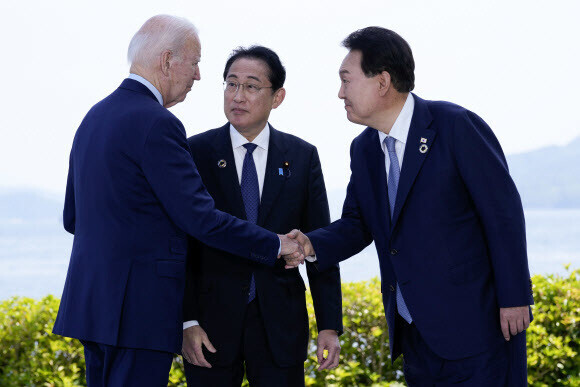hankyoreh
Links to other country sites 다른 나라 사이트 링크
[Editorial] At G7 summit, Yoon lets diplomacy with China fall by the wayside

The leaders of South Korea, the US, and Japan met on Sunday in Hiroshima, Japan, on the sidelines of the Group of Seven summit there, where they pledged to deepen trilateral security cooperation, including the real-time sharing of North Korean missile warning information.
While the trilateral meeting lasted only two minutes, President Yoon Suk-yeol’s diplomatic shift toward a one-way diplomacy with the US, Japan, and South Korea as the frontline of China’s containment was made more apparent by his attendance at the G7 summit.
Yoon, US President Joe Biden, and Japanese Prime Minister Fumio Kishida pledged to “take their trilateral cooperation to new heights” by deepening cooperation in areas such as trilateral security cooperation that includes real-time sharing of North Korean missile warning information, trilateral cooperation on the countries’ strategies in the Indo-Pacific, economic and national security issues, and engagement with the Pacific Islands.
While trilateral intelligence sharing and military cooperation to counter North Korean missiles continues to progress, it is becoming clear that South Korea is becoming more deeply involved in the US’ and Japan’s Indo-Pacific strategies, which are formulated with an aim to contain China.
This is the third time in 10 months that summits between South Korea, US, and Japan have taken place, following July and November of 2022. This time, however, the meeting was limited to a two-minute chat due to Biden’s domestic schedule and Ukrainian President Volodymyr Zelenskyy’s surprise visit to Hiroshima. Biden invited the two leaders of South Korea and Japan to meet again in Washington in the near future.
Under the Yoon administration, South Korea’s diplomatic relations with the US and Japan have progressed at an unprecedented pace, with South Korean diplomacy tilting excessively toward the United States amidst the US-China rivalry.
The declaration that came out of this summit of seven major nations was largely aimed at keeping China and Russia in check, but also included an initiative to build broader supply chains by bringing together South Korea, Australia, and emerging and developing countries to reduce dependence on China.
While South Korea did not participate in the joint statement as it is not a member of the G7, Yoon emphasized his “values diplomacy” keynote during the G7 summit, strongly criticizing North Korea and Russia as “prime examples of violations of universal values and the international rule of law.”
This is why, after meeting with Ukrainian President Zelenskyy on Sunday, he said, “We will work to quickly provide Ukraine with the goods it needs, such as demining equipment and emergency transport vehicles.”
While it is necessary to strengthen cooperation with the US and Japan on security and supply chain reorganization, it is very concerning that Yoon is focusing his diplomatic efforts on “values diplomacy” centered on the US, Japan, and South Korea, leaving diplomacy with China to fall by the wayside.
In a recent video interview released by the Ministry of Economy and Finance, senior economic officials, including former deputy prime ministers, said Korea “should not turn its back on China,” adding that the country should “maintain cooperation with the US and use economic relations with China to flexibly reduce economic shocks.”
Yoon should no longer ignore the calls from Koreans young and old for complex diplomacy that takes South Korea’s reality into account.
Please direct questions or comments to [english@hani.co.kr]

Editorial・opinion
![[Column] Park Geun-hye déjà vu in Yoon Suk-yeol [Column] Park Geun-hye déjà vu in Yoon Suk-yeol](https://flexible.img.hani.co.kr/flexible/normal/500/300/imgdb/original/2024/0424/651713945113788.jpg) [Column] Park Geun-hye déjà vu in Yoon Suk-yeol
[Column] Park Geun-hye déjà vu in Yoon Suk-yeol![[Editorial] New weight of N. Korea’s nuclear threats makes dialogue all the more urgent [Editorial] New weight of N. Korea’s nuclear threats makes dialogue all the more urgent](https://flexible.img.hani.co.kr/flexible/normal/500/300/imgdb/original/2024/0424/7317139454662664.jpg) [Editorial] New weight of N. Korea’s nuclear threats makes dialogue all the more urgent
[Editorial] New weight of N. Korea’s nuclear threats makes dialogue all the more urgent- [Guest essay] The real reason Korea’s new right wants to dub Rhee a founding father
- [Column] ‘Choson’: Is it time we start referring to N. Korea in its own terms?
- [Editorial] Japan’s rewriting of history with Korea has gone too far
- [Column] The president’s questionable capacity for dialogue
- [Column] Are chaebol firms just pizza pies for families to divvy up as they please?
- [Column] Has Korea, too, crossed the Rubicon on China?
- [Correspondent’s column] In Japan’s alliance with US, echoes of its past alliances with UK
- [Editorial] Does Yoon think the Korean public is wrong?
Most viewed articles
- 1‘We must say no’: Seoul defense chief on Korean, USFK involvement in hypothetical Taiwan crisis
- 2N. Korean delegation’s trip to Iran shows how Pyongyang is leveraging ties with Moscow
- 3‘Weddingflation’ breaks the bank for Korean couples-to-be
- 4Korea sees more deaths than births for 52nd consecutive month in February
- 5[Column] Park Geun-hye déjà vu in Yoon Suk-yeol
- 6Will NewJeans end up collateral damage in internal feud at K-pop juggernaut Hybe?
- 7[Column] Has Korea, too, crossed the Rubicon on China?
- 8Amnesty notes ‘erosion’ of freedom of expression in Korea in annual human rights report
- 9Samsung barricades office as unionized workers strike for better conditions
- 10[Column] The clock is ticking for Korea’s first lady